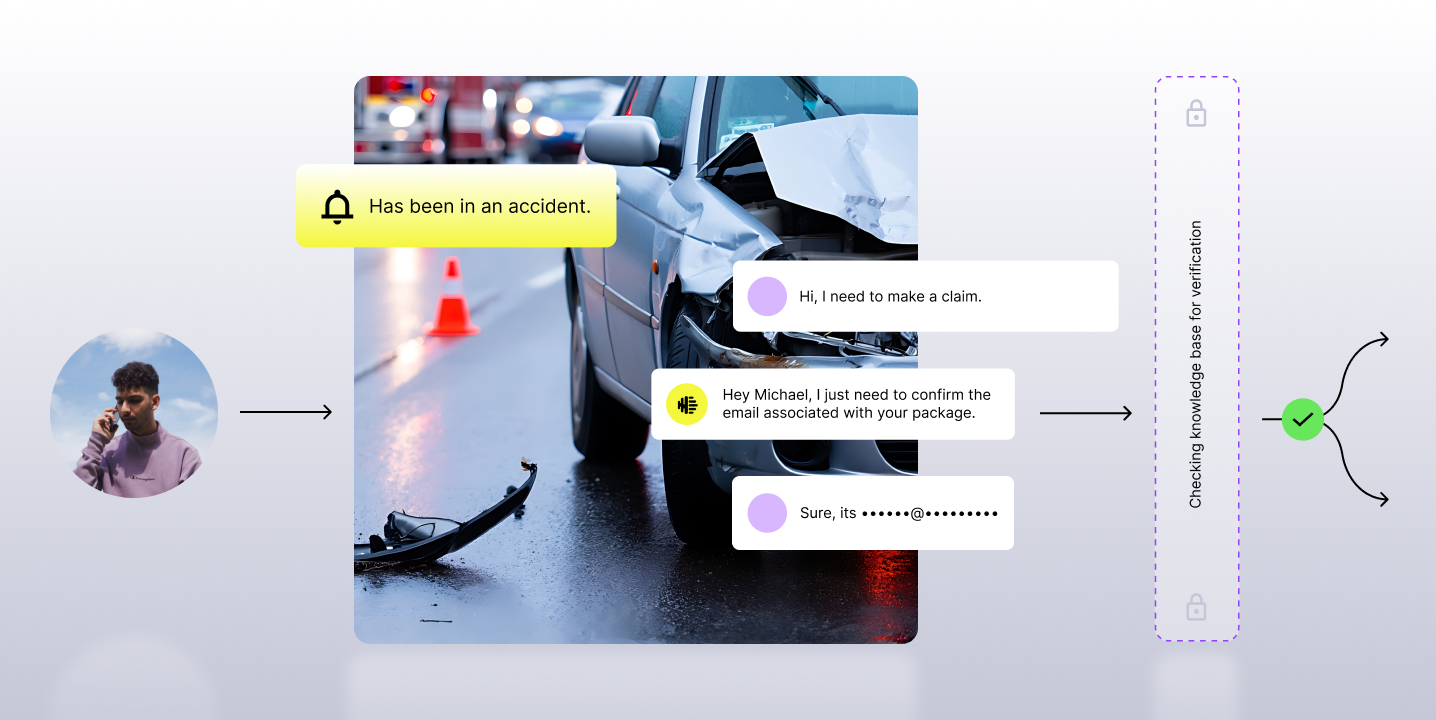Success in today’s business landscape is driven by correctly understanding and optimizing customer interactions.
Conversation intelligence software has emerged as a game-changer in this regard. It offers profound insights into customer conversations and empowers contact centers to deliver exceptional service.
Observe.AI stands at the center of innovation, offering premier conversation intelligence software designed exclusively for contact center needs.
Keep reading to discover how conversation intelligence software can profoundly impact contact center operations. From enhancing agent performance to optimizing customer experience, we’ll explore how Observe.AI can be integrated into your workflows.
Pro-tip: Our real-world success stories and tangible examples highlight this.
Join us as we uncover the unparalleled advantages of leveraging conversation intelligence software in contact centers and discover why Observe.AI stands out as the ultimate partner for you to work with to unlock customer delight.
The Value of Conversation Intelligence Software
For modern contact centers, conversation intelligence tools can make or break their sales team’s operational success. As customer expectations evolve, contact centers face the dual challenge of delivering exceptional service while efficiently managing large volumes of data-driven interactions and messaging.
At its essence, conversation intelligence software is a suite of AI-powered solutions designed to analyze and extract valuable insights from customer interactions for omnichannel contact centers. This solution covers various channels, including calls, chats, emails, and social media.
Conversation AI software rises to meet this challenge by providing a comprehensive understanding of customer conversations for sales managers, going beyond mere data collection to offer nuanced summaries of customer sentiment, preferences, and behavior.
By leveraging advanced analytics and machine learning algorithms, organizations can unlock the hidden potential within their conversation data, gaining actionable intelligence to drive strategic decision-making, optimize sales performance processes, and personalize interactions.
More than 90% of users report faster complaint resolution, and over 80% have observed improved call volume processing with AI.
Key Features of Conversation Intelligence Software
Here are the core features to know:
- Sentiment Analysis: Sentiment analysis is one of the foundational pillars of conversation intelligence software. This feature employs natural language processing (NLP) algorithms to detect and analyze the emotional tone and sentiment expressed during customer interactions. Contact centers can swiftly identify areas of customer dissatisfaction or delight by gauging whether sentiments are positive, negative, or neutral. This insight allows for targeted interventions to enhance customer experience and satisfaction.
- Keyword Detection: Through advanced algorithms, this functionality automatically identifies and highlights specific keywords or phrases within customer conversations that hold significance for the business. Whether it’s mentions of competitor brands, product names, or emerging trends, keyword detection empowers contact centers to pinpoint critical insights, identify significant trends, and uncover actionable opportunities for improvement.
- Real-Time Insights and Feedback: Conversation intelligence software offers real-time feedback capabilities, providing contact center agents and supervisors instant visibility into ongoing customer interactions. This real-time feedback loop enables proactive interventions, allowing agents to course-correct mid-conversation, address customer concerns promptly, and ensure consistently high-quality interactions.
- Transcription and Analysis: This software eliminates the need for manual note-taking by automatically transcribing calls, chats, and other communication channels. This automation enables marketing teams to focus on active listening and engagement in their playbooks. Additionally, sophisticated analytics tools parse through transcribed data, identifying key trends, patterns, and insights that drive sales enablement, informed decision-making in customer support, and better follow-ups.
- AI-Driven Insights: Artificial intelligence (AI) and machine learning capabilities are at the heart of conversation intelligence software. These advanced technologies power the software to generate actionable insights from vast conversation data while reducing manual intervention previously required in traditional contact centers.
Enhancing Customer and Agent Experiences
Conversation intelligence software can elevate customer satisfaction and agent performance when used correctly.
Let’s explore how.
Improving Customer Interactions
Harnessing conversation intelligence opens up a world of opportunities for contact centers to improve customer interactions through call data.
Here are some strategies to make the most of this technology and close deals:
- Sentiment Analysis: Call center sentiment analysis can be used to gauge customer emotions and satisfaction levels during interactions. By identifying positive or negative sentiments, contact centers can tailor responses to address concerns or reinforce positive experiences.
- Keyword Detection: This enables contact centers to pinpoint common issues, trends, or areas of interest among customers, allowing for proactive resolution and targeted improvements.
- Real-time Feedback: Leverage real-time feedback provided by conversation intelligence software to adjust agent responses on the fly. Real-time conversation monitoring enables contact centers to intervene as needed and guarantee timely and effective responses to customer inquiries.
- Tailored Service: Agents can enhance the customer experience by providing customized recommendations and solutions based on insights into preferences, purchase history, and previous interactions. AI voice calling agents in particular can enhance this process by providing automated, intelligent responses to common customer inquiries, freeing up human agents to focus on more complex issues.
- Proactive Engagement: Conversation intelligence can detect signals of dissatisfaction or upcoming needs to contact customers before issues escalate, encouraging loyalty and satisfaction.
Boosting Agent Performance
Here’s how contact centers can use conversation intelligence to boost agent effectiveness:
- Training Support: Conversation intelligence can identify coaching opportunities and agent training needs. By analyzing interactions and identifying areas for improvement, contact centers can tailor training programs to address specific skills or knowledge gaps, ensuring that agents are equipped to effectively handle various customer scenarios.
- Performance Feedback: Based on insights gathered from conversation intelligence, you can provide real-time performance feedback to agents. Agents can continuously improve their performance and deliver better outcomes through immediate feedback on communication style, adherence to scripts or guidelines, and resolution strategies.
- Identifying Best Practices: The software can also analyze conversations to identify top performers and extract best practices for sales coaching. With this data, you can better understand what sets high-performing agents apart in their phone calls and share these insights with the broader team, enabling all agents to adopt effective techniques and strategies for better team performance.
- Enhancing Job Satisfaction: By highlighting exceptional performance and providing recognition, contact centers can boost agent morale, motivation, and job satisfaction, leading to higher retention rates and better overall performance.
- Comprehensive Agent Monitoring: Pairing conversation intelligence with call center screen recording software provides a deeper layer of visibility, allowing managers to review agent interactions in real-time and identify areas for improvement with video evidence. This approach ensures better compliance, reduces risk, and enhances training effectiveness.
Implementing Contact Center Conversation Intelligence
Here are some best practices for onboarding and integrating conversation intelligence software into your workflows for the best automation:
- Assess Your Center’s Needs: Before diving into the selection process, assess your contact center’s specific goals, challenges, and requirements. Determine key metrics you want to improve, such as customer satisfaction, agent performance, or operational efficiency, and prioritize these when evaluating potential solutions.
- Evaluate Available Solutions: Research and evaluate different conversation intelligence software providers to find one that meets your center’s needs. Look for features like real-time transcription, sentiment analysis, and customizable dashboards while considering pricing, scalability, and seamless integration with current systems.
- Prioritize Integration: Choose a conversation intelligence platform that seamlessly integrates with your contact center’s existing technology stack, including CRM systems, call recording software, and analytics tools. Integration ensures smooth data flow and allows you to leverage insights from conversation intelligence across your organization.
- Train Your Team: Ensure your agents, new reps, and sales leaders receive thorough training on maximizing the conversation intelligence software’s potential. Ensure they understand how to interpret analytics, extract actionable insights, and apply them to improve customer interactions and overall performance.
- Establish Clear Objectives: Set clear objectives and KPIs for implementing conversation intelligence software in your contact center. Define success and regularly measure progress against these goals. Adjust your strategies and tactics based on the insights gleaned from conversation intelligence data.
Measuring Success with Conversation Intelligence Software
Here are some key performance indicators (KPIs) and metrics to track the impact of conversation intelligence software on improving customer service phone calls and operational efficiency:
- Customer Satisfaction Scores (CSAT): Monitor changes in CSAT scores before and after implementing conversation intelligence software. Evaluate customer feedback to identify pain points and improvement areas, monitoring satisfaction progress over time.
- First Call Resolution (FCR) Rate: Calculate the rate at which customer issues are settled in the initial interaction. Conversation intelligence can help identify common issues and provide insights to empower agents to resolve queries more efficiently, leading to higher FCR rates.
- Average Handling Time (AHT): Monitor agents' average time handling customer interactions. Conversation intelligence can help identify inefficiencies in call-handling processes and provide insights to streamline workflows, ultimately reducing AHT.
- Agent Performance Metrics: Monitor agent performance metrics such as call quality, adherence to scripts and compliance guidelines, and customer satisfaction ratings. The software can provide real-time feedback and coaching opportunities to help agents improve their performance, making this a valuable productivity metric.
- Conversion Rates: Assess the percentage of transactions or conversions resulting from customer interactions. Conversation intelligence can analyze sales calls to identify successful techniques and strategies top-performing agents use, helping to replicate success across the team.
- Operational Efficiency: Track metrics such as customer call volume, call abandonment rates, and wait times to evaluate the efficiency of contact center operations. This evaluation helps pinpoint bottlenecks and inefficiencies, allowing contact centers to optimize workflows and allocate resources.
- Revenue Impact: Measure the impact of conversation intelligence on revenue generation and revenue intelligence by tracking metrics such as sales revenue per call or upsell/cross-sell rates. Conversation intelligence can identify opportunities to increase revenue through more effective sales reps techniques and personalized customer sales processes.
Navigating the Future of Conversation Intelligence
With the ongoing evolution of conversation intelligence, it’s crucial for contact centers to remain proactive in technology and customer satisfaction trends.
Let’s explore some potential developments in conversation intelligence technology and their potential impact on the contact center industry, especially the growing role of Large Language Models (LLMs):
- Growing Role of Large Language Models (LLMs): The emergence of Large Language Models (LLMs) such as GPT-3 and its successors is expected to significantly impact conversation intelligence technology. LLMs can process vast amounts of text data and generate human-like responses, upscaling the capabilities of conversation intelligence software for analyzing and understanding customer interactions.
- Artificial Intelligence (AI) and Machine Learning Advancements: As AI and machine learning continually advance, conversation intelligence software will become more sophisticated. These advancements will drive more accurate sentiment analysis, deeper insights into customer behavior, and personalized interactions in real time.
- Integration with Emerging Technologies: Conversation intelligence software's expected integration with emerging technologies like chatbots and natural language processing (NLP) systems will foster multi-channel seamless communication and offer customers more tailored and efficient assistance.
- Enhanced Data Visualization and Reporting: Future conversation intelligence platforms may offer even more advanced data visualization and reporting capabilities, allowing contact center managers to intuitively visualize trends, patterns, and insights.
- Predictive Analytics and Forecasting: Conversation intelligence software may incorporate predictive analytics and sales forecasting capabilities to anticipate customer needs and trends. By analyzing historical data and patterns, contact centers can proactively address issues, optimize resource allocation, and improve win rates.
- Expansion into New Industries and Use Cases: As its advantages become increasingly apparent, conversation intelligence is set to cross traditional boundaries, venturing beyond sales engagement into new industries and applications. The healthcare, finance, and retail sectors may leverage conversation intelligence to enhance customer service, improve patient outcomes, and drive business growth.
- Focus on Ethical AI and Data Privacy: With increasing concerns about data privacy and ethical AI practices, conversation intelligence software providers will need to prioritize transparency, accountability, and compliance. Contact centers should use conversation intelligence ethically and responsibly, respecting customer privacy and maintaining trust.
Embrace Conversation Intelligence with Observe.AI
Conversation intelligence can help you stay competitive in today’s rapidly evolving landscape and elevate your customer service to new heights.
It’s evident that embracing conversation intelligence is no longer just an option but a necessity for contact centers that want to thrive in the digital age.
While various providers, including Observe.AI, offer robust conversation intelligence solutions, the key is choosing a partner that aligns with your center’s unique needs and aspirations. Our RFP template can help you make a choice.
Why choose us?
Our platform distinguishes itself through advanced technology and a steadfast commitment to customer success and continuous innovation.
So, if you’re ready to take your contact center to the next level and unlock the full potential of conversation intelligence with a contact center AI software, we invite you to explore Observe.AI's comprehensive suite of solutions.
Don't wait any longer—embrace conversation intelligence with Observe.AI and revolutionize your contact center today!

.png)














